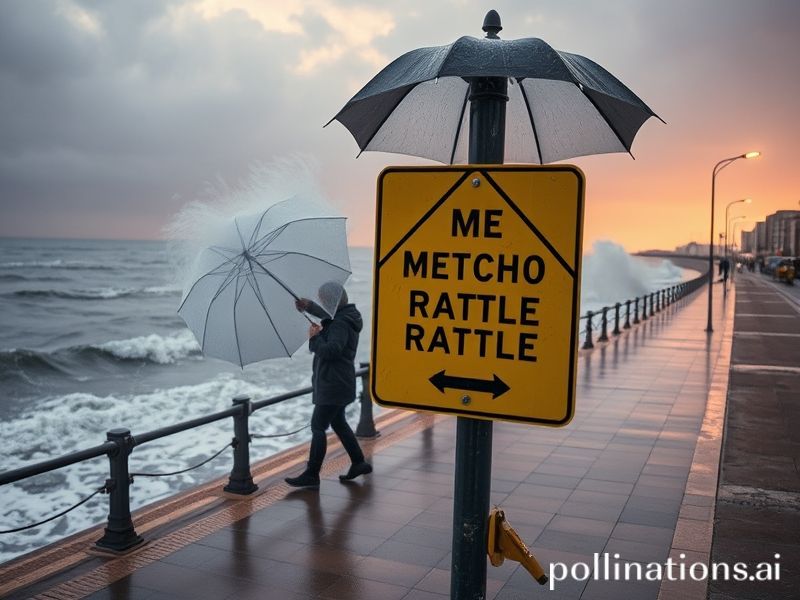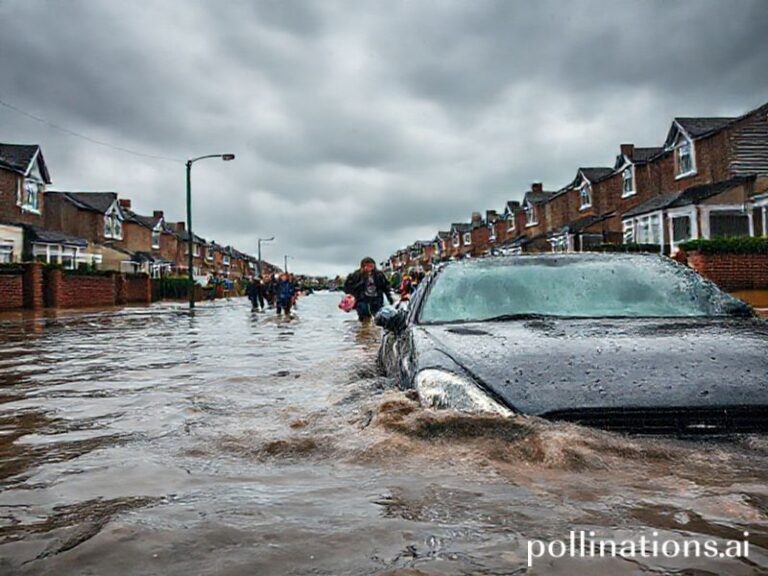Blown Britannia: How the UK’s Latest Wind Tantrum Shakes the World (and Your Grocery Bill)
Blown Britannia: How a Small Island’s Breeze Becomes a Global Mood Ring
By Our Man in the Jet Stream, filing from an airport lounge whose roof is currently somewhere over the North Sea
LONDON—The United Kingdom has issued yet another “yellow warning” for strong winds, which is meteorologist-speak for “batten down the ornamental gnomes.” Gusts of 70 mph are expected to rattle the Shard, rearrange the Cotswolds, and—most critically—reignite the planet’s most reliable barometer of existential dread: the international news cycle.
From Tokyo to Toronto, editors are already slotting the story next to the latest crypto-currency meltdown and a grainy photo of a celebrity eating alone. Why does a soggy archipelago’s bad hair day command such planetary attention? Simple: Britain’s weather is the world’s comfort blanket. When the Queen’s own subjects are photographed clinging to lampposts like damp prayer flags, everyone else can mutter, “Well, at least we’re not there,” and get on with their own local catastrophes in peace.
Global Repercussions, or How a Gale in Kent Moves Cheese in Wisconsin
Meteorologically, the tempest is the tail end of a storm baptized by the Free University of Berlin—because even cyclones need LinkedIn-friendly names these days. It has already sideswiped Iceland, traumatized a few puffins, and will proceed to drown out Dutch tulip fields before dying of embarrassment in northern France. The butterfly effect is real: delayed ferries in the English Channel translate into fewer wheels of Stilton reaching New York restaurants, which in turn triggers a 0.3 % dip in midtown sommelier smugness. Somewhere, a hedge-fund algorithm sneezes.
Meanwhile, energy traders in Singapore are furiously refreshing satellite feeds. A sturdy British gale means extra electricity from offshore turbines, which depresses European gas prices, which nudges Qatar to reroute a tanker to Bangladesh, which—if you squint hard enough—keeps a garment factory in Dhaka humming so that British consumers can buy £4 rain ponchos that will disintegrate in precisely this sort of weather. The circle of life, sponsored by fast fashion and poor planning.
Diplomatic Fallout
In Brussels, officials have postponed yet another post-Brexit fishing-rights Zoom, ostensibly because “participants may experience connectivity issues due to adverse weather.” Translation: everyone is secretly relieved not to spend another afternoon pretending mackerel are a strategic resource. In Washington, the State Department has issued a travel advisory warning Americans that “parts of the UK may experience localized travel disruptions,” which is bureaucratic poetry for “your umbrella will become a lethal weapon.”
Back on the soggy ground, the British response has been characteristically stoic: queues at Pret remain orderly, commuters cling to the national mantra of “mustn’t grumble,” and tabloids publish photographs of airborne wheelie bins as though auditioning for the Turner Prize. The BBC helpfully advises listeners to secure garden furniture, prompting millions to look outside, shrug at the £9 plastic chair they bought during lockdown, and decide that if it ends up in the neighbor’s koi pond, so be it—insurance is a myth anyway.
Humanity’s Peculiar Priorities
Storms like these expose the exquisite absurdity of our priorities. In the Philippines, typhoons routinely redefine coastlines, yet the world shrugs. But if three tiles slide off a Cotswold cottage, it’s trending on six continents. Perhaps we need the UK’s genteel disasters to make Armageddon palatable—like watching the apocalypse through a doily. It’s climate change with afternoon tea.
Conclusion: The Wind That Shakes the Globe
Ultimately, Britain’s latest blowhard moment is a reminder that in our hyper-connected age, even a modest breeze can ripple outward like an ironic tweet from a minor royal. Supply chains, energy markets, diplomatic calendars, and the fragile egos of influencers dependent on rooftop selfie lighting—all tremble before the same low-pressure system. So while the Met Office reassures us the winds will ease by Thursday, the global aftershocks will linger. Somewhere, a Bangladeshi factory manager is checking weather apps for Cardiff, a Belgian bureaucrat is rescheduling PowerPoint slides, and a Singaporean trader is Googling “how waterproof is cryptocurrency?”
And in the departure lounge, your correspondent sips an £8 flat white while the departures board flickers like a nervous tic. The flight to Frankfurt is delayed—naturally—because the incoming plane is circling Manchester, waiting for the wind to stop rearranging the runway. We are all, it seems, hostages to one small island’s talent for turning drizzle into drama.







